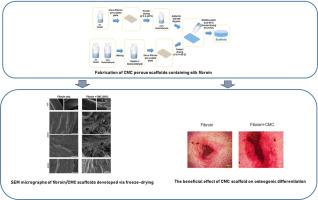Enhanced osteogenic potential of spider silk fibroin-based composite scaffolds incorporating carboxymethyl cellulose for bone tissue engineering
Q3 Biochemistry, Genetics and Molecular Biology
引用次数: 0
Abstract
This study aimed to investigate the characteristics of composite scaffolds that combine fibroin derived from spider silk and carboxymethyl cellulose (CMC) in the field of bone tissue engineering. Fibroin, obtained from spider silk, serves as a valuable biomaterial and constitutes the primary component of fibrous protein-based spider silk threads. To enhance the binding efficiency in bone formation after scaffold implantation, CMC was integrated into fibroin, aiming to improve the injectability properties of the scaffold in bone substitutes. For bone marrow mesenchymal stem cell (BMSC) tissue engineering, BMSCs isolated from mice were seeded onto the scaffold, and the rate of cell proliferation was assessed. The composite scaffold, with the addition of CMC to fibroin, exhibited superior characteristics compared to scaffolds containing only silks, including porous morphology, porosity, surface wettability, water absorption, and thermal properties. Alkaline phosphatase activity in BMSCs was significantly higher in the CMC-containing scaffold compared to the silk-only scaffold, and the CMC-containing scaffold demonstrated increased expression of osteocyte marker genes and proteins. In conclusion, the biocompatibility and hydrophilicity of CMC-containing scaffolds play essential roles in the growth and proliferation of osteocytes. Furthermore, the CMC-containing scaffold design proposed in this study is expected to have a substantial impact on promoting ossification of BMSCs.

掺入羧甲基纤维素的蛛丝纤维素基复合支架在骨组织工程中的成骨潜力得到增强
本研究旨在探讨结合了蜘蛛丝纤维素和羧甲基纤维素(CMC)的复合支架在骨组织工程领域的特性。从蜘蛛丝中提取的纤维蛋白是一种宝贵的生物材料,也是以纤维蛋白为基础的蜘蛛丝的主要成分。为了提高支架植入后在骨形成过程中的结合效率,CMC 被整合到纤维素中,目的是改善骨替代品支架的可注射性。在骨髓间充质干细胞(BMSC)组织工程中,将从小鼠体内分离的骨髓间充质干细胞播种到支架上,并评估细胞的增殖率。在纤维素中添加了 CMC 的复合支架在多孔形态、孔隙率、表面润湿性、吸水性和热性能等方面均优于仅含丝的支架。与仅含蚕丝的支架相比,含 CMC 的支架中 BMSCs 的碱性磷酸酶活性明显更高,而且含 CMC 的支架显示骨细胞标记基因和蛋白质的表达量增加。总之,含 CMC 支架的生物相容性和亲水性对骨细胞的生长和增殖起着至关重要的作用。此外,本研究提出的含 CMC 支架设计有望对促进 BMSCs 骨化产生重大影响。
本文章由计算机程序翻译,如有差异,请以英文原文为准。
求助全文
约1分钟内获得全文
求助全文

 求助内容:
求助内容: 应助结果提醒方式:
应助结果提醒方式:


